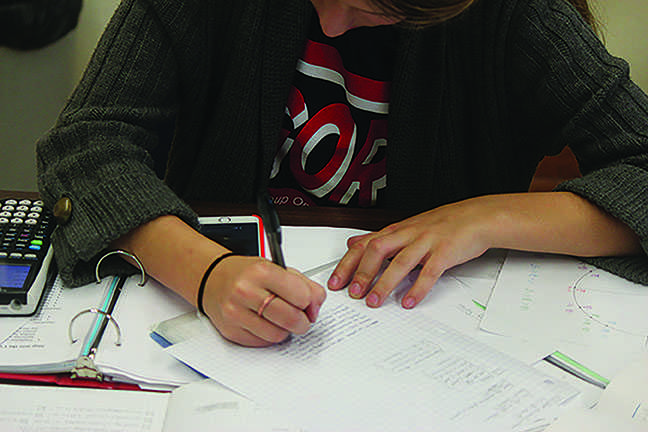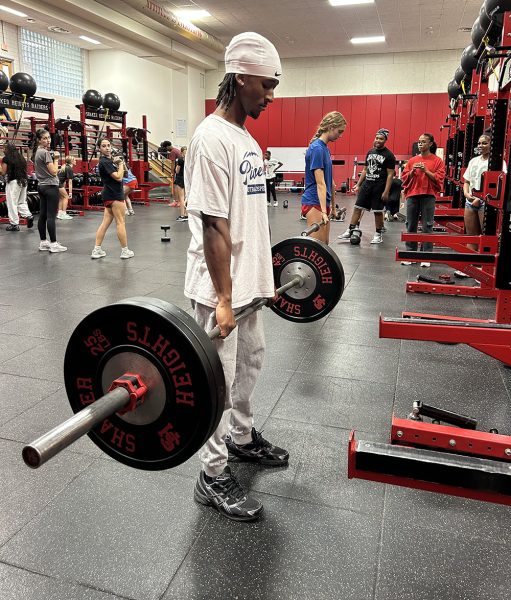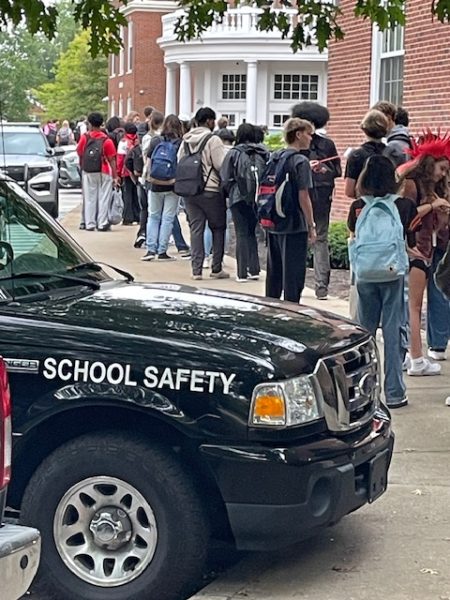‘Rite Idea: Shaker’s Survival of the Cheaters
Educational standards, college requirements demand too much from students
Photo Illustration by Zachary Nosanchuk
Cheating, although considered dishonorable by teachers and administration, is a common last resort for students burdened with high-level classes and high-level aspirations. An informal Shakerite survey of such students revealed that 93 percent admitted to copying another student’s homework in the past year.
It’s three in the morning on a Wednesday. Frustrated tears threaten to spill from exhausted eyes onto Tuesday night’s workload: an essay about this quarter’s English book, math worksheets, foreign language practice, a lab report and 40 pages of history reading. Dozens of students experiencing the same unbearable stress share pictures of their completed assignments on group chats, attempting to lift some of the burden from their classmate’s drooping shoulders.
Nobody pauses to think about their teacher’s frowning face as they hastily jot down their friends’ answers, desperate to get a few hours of restless sleep before the big test in the morning and game in the afternoon. The worksheets can wait until lunch, and the Internet offers plenty of book summaries, so the essay can be pieced together during study hall. None of the completed assignments will be perfect, and they will most likely teach nothing, but hairs will be pulled and tears will be shed during the grueling process of getting them done.
Then it’s three in the morning on a Thursday, and it’s the same teeth-clenching process all over again.
Students are told to put school first: Memorize formulas before family time, solve equations before sports practice, read a required book before the popular new teen series. When it proves to be too much for the student — and it always does — they’re told the workload isn’t the problem; their time management skills are.
Now the student is stuck between a rock and a hard place. One option is dropping extracurriculars and devoting undivided time to schoolwork, putting in enormous effort to raise grades even half a letter to make teachers happy and college resumes shinier. Or, a student could stick with extracurriculars, which offer the only relief from weekly educational torment, and cheat his or her way through the academic side of high school. Of course, neither is the ideal path.
A comprehensive understanding of curriculum is what everyone claims to want for students, but is that really what anybody cares about anymore? Any miserable student struggling to study at three in the morning on a weekday might not be able to analyze “The Great Gatsby,” but they can easily describe how neglected they feel. Conference periods offer extra help with concepts they don’t understand, counselors offer tips to keep their sanity, but only fellow students understand the battlefield that high school has become.
This is when cheating comes into play. When we think of cheating, we think of high school dropouts who never gave two hoots about any core subject, cared little about grades, Googled every answer on their homework and snuck looks at their neighbors’ papers during tests. We don’t picture the Ivy League-bound, extracurricularly-involved poster child, whose shining college resume owes a decent portion of its perfection to online notes and generous group chats in which students swap completed assignments.
Learning and understanding fade into the background when college preparations begin, because college applications, along with the rest of the adult population, demand good grades and test scores from students by any means necessary. In a perfect world, students would earn their grades and scores with integrity.
Unfortunately, we don’t live in that world.
So no, John Doe can’t drop his extracurriculars because he’d never get into college with that lack of involvement. Yet Harvard would hate if he failed his classes, so he joins a group chat with his friends from math, and they divide the work in the packet. He skims through Sparknotes for his assigned English reading and scrolls through Quizlet for the answers to his science worksheet. This leaves enough time to attend history conferences before a three-hour sports practice. He finally has time for a meal with his family and makes plans to see his friends on the weekend before going to bed at a reasonable hour. His integrity died along the way, but it was a small price for his sanity.
Children have become their test scores. Teachers see their pupils as percentages and letters. Colleges see their applicants as numbers and essays. School districts can’t see their students as the future of this world when all they seem to want is for their children to get good grades so that the school can reflect that success.
Students know this. They feel the insufferable pressure to become that coveted, yet nearly unattainable, “A,” and they crack under that weight. They know that “A” isn’t worth the tears, the sleepless nights and the misery, and so they have resorted to a less respectable route to get there.
Who can blame them?








